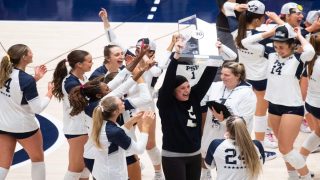Bill Belichick’s foray into college football drew plenty of double takes across the industry, but the logic behind his decision might have been as simple as it was surprising.
“He’s a football coach,” a source close to Belichick said. “He’s going to coach somewhere.”
After 49 seasons in the NFL, Belichick made a stark career change Wednesday when he accepted the head coaching job at the University of North Carolina.
Welcome to Chapel Hill, Bill Belichick!
The eight-time Super Bowl Champion has officially been named our next @UNCFootball Head Coach. #GoHeels x #ChapelBill pic.twitter.com/cnngQI7gnC
— UNC Tar Heels (@GoHeels) December 12, 2024
The 72-year-old’s pursuit of Don Shula’s wins record has been put on hold, perhaps permanently. Belichick needed 15 wins to surpass the NFL’s all-time mark of 347.
The record meant a lot to Belichick, particularly in recent years when it appeared to be more attainable. So, why did he call off the chase?
It’s perhaps more important to assess the situation from the opposite viewpoint.
One NFL team with a coaching vacancy had already ruled out the idea of interviewing Belichick, according to a league source. Sources with a couple of other teams with potential head coach vacancies didn’t believe there’d be enough support within the building to hire Belichick. The New York Jets, who will be hiring a coach and general manager, were never considered a possibility due to their long-running shared animosity for each other.
And among the seven coaching vacancies last year — excluding the New England Patriots, who fired Belichick — the architect of the greatest dynasty in league history only drew serious interest from the Atlanta Falcons. Several of those teams quickly dismissed the idea of interviewing Belichick, according to league sources. Some even expressed relief Belichick wouldn’t disrupt the organization’s power structure.
Belichick, the most prepared figure in the NFL for so long, had to recognize a chilling reality: He’d once again be a long shot to get a job in the league’s upcoming hiring cycle. It’s common for coaches to put out feelers to gauge their attractiveness to organizations.
“(Belichick) burned a lot of bridges over his career,” a high-ranking team executive said.
Belichick still wanted to coach, though, so it was important for him to act. North Carolina, which employed his father in the 1950s, was the most high-profile program with an opening. Belichick turns 73 in April and couldn’t run the risk of being shut out of another hiring cycle.
“If he wanted to coach again, he almost had to take this job,” another team executive said.
Another longtime Belichick associate thought the move to UNC made sense for other reasons, too. Belichick will essentially have unilateral control over the program, which wouldn’t necessarily be the case if he had gotten another NFL opportunity. And a handful of Belichick’s closest friends — Nick Saban, Greg Schiano, Chip Kelly, Kirk Ferentz and Jedd Fisch — have enjoyed success at the college level. He can use them as resources as he acclimates to a different football world.
Also consider that Belichick could have waited to see if there’d be openings with the Dallas Cowboys, New York Giants or Jacksonville Jaguars — among other teams — but they ultimately might not have been great fits. Cowboys owner and general manager Jerry Jones isn’t ceding control of his front office, and it’s too early to know what the upcoming power structure will look like within the Giants and Jaguars if more drastic changes are on the way.
“There might be some owners who want (Belichick’s) structure and stability, but he is 72,” another longtime executive from a team that was involved in last year’s NFL hiring cycle said. “I think a lot of teams want to build something long-term, and he clearly has a capped timeline.”
Belichick’s resume still stands alone. He is viewed by his peers as the greatest coach of his era, if not in history. And last season, even as the Patriots wallowed to a 4-13 record, a couple of personnel executives said Belichick’s defense still displayed some revolutionary concepts.
But they had fair and objective criticisms about the way things ended with the Patriots, with their record worsening in each of his last two seasons and failing to win a playoff game over his final four years. Parting with quarterback Tom Brady was a head-scratcher, but the failure to find a suitable successor made the matter exponentially worse.
Belichick’s push for organizational control has also been at the center of discussion with teams. One executive referred to the Patriots as a “unicorn” during the Belichick era, as he won three Super Bowls in his first five seasons, gained considerably more control after Scott Pioli’s departure in 2009 and was able to run the team how he saw fit. That’s not a common structure for much of the league.
Plus, the model had deteriorated in Belichick’s later years with the Patriots. There was a push for more collaboration with the 2021 NFL Draft, but that collaboration fell apart in 2022, according to league sources. Patriots scouts were often frustrated by their lack of involvement after the annual combine — nearly two months before the draft — or their general inclusion in the building throughout the season.
“I think people would be concerned about the culture in the building,” a fourth executive said. “(Belichick’s) culture worked when they were winning, but he got fired because they weren’t winning.”
Of course, the culture also extends to the locker room. Modern-day players don’t relate to the old-school coaching approach the way they did 10 or even 20 years ago. As one of Belichick’s former players recently said, “It’s nice to go somewhere and not get told how much you suck every day.”
That player was not alone in that sentiment. And adding to that, coaches and executives from other teams were turned off by Belichick’s public alienation of former Patriots quarterback Mac Jones.
Belichick has enjoyed unprecedented levels of success throughout his career. No one around the league would ever deny that.
But while teams eye a long-term solution with their next head coach, they have a lot of fair questions about the way it fell apart in New England and whether Belichick would be the right fit within their organization. And even if Belichick did turn around an NFL team, his age limits his longevity.
Naturally, the same questions will exist at North Carolina, but here’s the difference: UNC was offering a job, and it was anything but guaranteed the NFL would do the same.
(Photo: Timothy T Ludwig / Getty Images)





